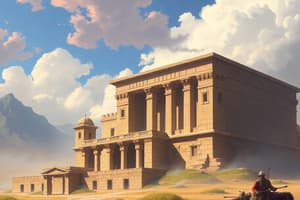Podcast
Questions and Answers
Which of the following is NOT a key historical concept explored in the text?
Which of the following is NOT a key historical concept explored in the text?
- Chronology
- Objectivity (correct)
- Perspective
- Causality
What is the primary difference between primary and secondary sources?
What is the primary difference between primary and secondary sources?
- Primary sources are always more reliable than secondary sources.
- Primary sources are limited to written documents, while secondary sources include other forms of evidence like artifacts.
- Primary sources are original materials from a specific time period, while secondary sources analyze these materials. (correct)
- Primary sources are written by historians, while secondary sources are not.
Which of the following BEST exemplifies the historical concept of 'context'?
Which of the following BEST exemplifies the historical concept of 'context'?
- Comparing the development of democracy in different countries.
- Understanding the impact of the printing press on the spread of knowledge. (correct)
- Examining the causes of the French Revolution.
- Analyzing the writings of a 19th-century philosopher.
Which historical era is characterized by the rise of feudalism and the spread of Christianity in Europe?
Which historical era is characterized by the rise of feudalism and the spread of Christianity in Europe?
Which of the following is an example of a primary source in historical research?
Which of the following is an example of a primary source in historical research?
Why is it important to acknowledge bias in historical accounts?
Why is it important to acknowledge bias in historical accounts?
What is the significance of studying material culture in historical research?
What is the significance of studying material culture in historical research?
Which of the following BEST illustrates the concept of 'interpretation' in history?
Which of the following BEST illustrates the concept of 'interpretation' in history?
Which field of historical study focuses on the production, exchange, and consumption of goods and services?
Which field of historical study focuses on the production, exchange, and consumption of goods and services?
Which of the following is NOT a benefit of studying history?
Which of the following is NOT a benefit of studying history?
The study of a society's art, literature, and religion falls under which branch of history?
The study of a society's art, literature, and religion falls under which branch of history?
What does the study of a society's government, institutions, conflicts, and leadership fall under?
What does the study of a society's government, institutions, conflicts, and leadership fall under?
How does studying history contribute to personal understanding of identity and place in the world?
How does studying history contribute to personal understanding of identity and place in the world?
Flashcards
Political History
Political History
Focuses on government, institutions, conflicts, and leadership.
Social History
Social History
Studies everyday life, social structures, and cultural relations.
Economic History
Economic History
Explores production, trade, consumption, and labor patterns.
Cultural History
Cultural History
Signup and view all the flashcards
Importance of Studying History
Importance of Studying History
Signup and view all the flashcards
Chronology
Chronology
Signup and view all the flashcards
Causality
Causality
Signup and view all the flashcards
Context
Context
Signup and view all the flashcards
Bias
Bias
Signup and view all the flashcards
Primary Sources
Primary Sources
Signup and view all the flashcards
Secondary Sources
Secondary Sources
Signup and view all the flashcards
Ancient History
Ancient History
Signup and view all the flashcards
Modern History
Modern History
Signup and view all the flashcards
Study Notes
Historical Periods
- History encompasses all past events, from early human activity to the present.
- History is a complex field, with various interpretations.
- Historians study many aspects of the past, ranging from significant political events to the daily lives of different societies.
Key Historical Concepts
- Chronology: The order of events, crucial for understanding cause-and-effect relationships.
- Causality: The reasons behind events, identifying factors leading to outcomes.
- Context: Examining events within their surrounding social, economic, political, and cultural circumstances.
- Bias: Recognizing that historical accounts reflect the perspectives of those who created them.
- Interpretation: History is a set of interpretations based on evidence, not fixed facts.
Methods of Historical Study
- Primary Sources: Original documents, artifacts, or materials from the period being studied (letters, diaries, photos).
- Secondary Sources: Analyses and interpretations of primary sources by historians (books, articles).
- Archaeological Evidence: Physical remains from the past, offering insights into cultures and societies.
- Oral Histories: Recorded accounts of events from individuals who lived through them.
- Analysis of Material Culture: Examining objects and artifacts to understand past societies.
Major Historical Eras
- Ancient History: Early civilizations like Mesopotamia, Egypt, Greece, and Rome, including developments in writing, government, and philosophy.
- Medieval History: The Middle Ages in Europe, encompassing feudalism, the rise of Christianity, and the Crusades.
- Early Modern History: Transition from the Middle Ages to modernity, featuring the Renaissance, Reformation, and the Age of Exploration.
- Modern History: Developments from the 18th century to the present, including the Industrial Revolution, major wars, and global interconnectedness.
- Contemporary History: The recent past, often defined by living memory.
Historical Context and Themes
- Political History: Government, institutions, conflicts, and leadership.
- Social History: Everyday life, social structures, culture, and relations between groups.
- Economic History: Production, trade, consumption, and labor patterns through time.
- Cultural History: Ideas, values, beliefs, and expressions (art, literature, religion).
- Intellectual History: Evolution of ideas, thought, and knowledge.
- Science and Technology History: Scientific and technological advancements and their societal impact.
Importance of Studying History
- Understanding historical precedents is crucial for addressing present-day issues.
- Studying history fosters critical thinking and analytical skills, encouraging questioning and exploration of different perspectives.
- Historical study cultivates empathy for different cultures and perspectives.
- It provides insights into personal identity and societal development.
- History research enhances communication, and research abilities.
Studying That Suits You
Use AI to generate personalized quizzes and flashcards to suit your learning preferences.




